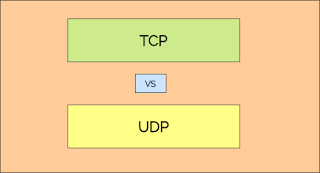In the intricate world of networking, the choice between TCP (Transmission Control Protocol) and UDP (User Datagram Protocol) plays a pivotal role in determining the efficiency and reliability of data transmission. At the heart of this decision lies the need to understand the nuances and applications of these two protocols.
Decoding TCP: The Reliability Champion
Understanding TCP
TCP, known as the backbone of reliable data transmission, operates on the principle of ensuring that data arrives intact and in the correct order. It establishes a connection-oriented communication, making it ideal for applications where accuracy and completeness are paramount.
Features of TCP
1. Reliability: TCP guarantees the delivery of data without loss or corruption, ensuring that the information received is identical to the information sent.
2. Connection-Oriented: A connection is established before data exchange, providing a stable and secure communication channel.
3. Ordered Delivery: Data is transmitted and received in the same order, maintaining the integrity of the message.
Unveiling UDP: The Speedster of Data Transmission
Understanding UDP
UDP, in contrast, prioritizes speed and efficiency over absolute reliability. It operates as a connectionless protocol, making it ideal for applications where occasional data loss is acceptable, such as real-time streaming and online gaming.
Features of UDP
1. Speed: Without the overhead of connection establishment and error-checking, UDP facilitates faster data transmission, making it suitable for time-sensitive applications.
2. Connectionless: No dedicated connection is established before data transfer, allowing for quick and lightweight communication.
3. Broadcasting: UDP supports broadcasting, making it advantageous for scenarios where data needs to be sent to multiple recipients simultaneously.
Choosing the Right Protocol: TCP or UDP?
Project-Specific Considerations
The decision between TCP and UDP hinges on the specific requirements of the project. Understanding the nature of the data being transmitted, the importance of reliability, and the tolerance for occasional data loss are crucial factors in making an informed choice.
Real-World Applications
TCP Applications: Web browsing, file transfer, email communication, and any scenario where data integrity is paramount.
UDP Applications: Video streaming, online gaming, live broadcasting, and scenarios where speed is of the essence.
TCP vs. UDP: A Detailed Comparison
Reliability vs. Speed
TCP prioritizes reliability by ensuring the delivery of data without compromise, making it suitable for applications where accuracy is critical. On the other hand, UDP sacrifices some reliability in favor of speed, making it the preferred choice for time-sensitive applications.
Connection Establishment
TCP requires the establishment of a connection before data transfer, adding a layer of security and stability. UDP, being connectionless, skips this step, allowing for quicker data transmission.
Error Handling
TCP employs error-checking mechanisms to identify and rectify any data corruption or loss. In contrast, UDP lacks such error-checking, making it susceptible to occasional data loss.
Key Difference Between TCP (Transmission Control Protocol) and UDP (User Datagram Protocol)
| TCP | UDP |
|---|---|
| TCP stands for Transmission Control Protocol | UDP stands for User Datagram Protocol |
| It guarantees delivery of data | Delivery of data cannot be guaranteed |
| It is a connection-oriented protocol. | It is the Datagram oriented protocol |
| It is slow | It is fast |
| It provides flow control and error checking method | It has only the basic error checking method |
| It provides acknowledgment of data. | No acknowledgment |
| Header size is 20 bytes. | Header size is 8 bytes. |
| It is heavy-weight. | It is light-weight. |
| Retransmission of lost packets is possible | No retransmission of lost packets |
| Used by HTTP, HTTPs, FTP,Telnet etc | Used by DNS, DHCP,VoIP etc |
| It is suited for applications that require high reliability | It is suitable for applications that need fast, efficient transmission |
| Three-way handshake | No handshake |
Frequently Asked Questions:
Q1: TCP vs. UDP: Which is More Secure?
Answer: While TCP provides a secure connection through its establishment process, UDP sacrifices some security for speed. The choice depends on the specific security needs of the application.
Q2: Can TCP and UDP be Used Together in a Single Application?
Answer: Yes, in certain scenarios, a hybrid approach that combines elements of both TCP and UDP can provide a more comprehensive solution, leveraging the strengths of each protocol.
Q3: What Applications Require the Speed of UDP?
Answer: Applications such as online gaming, video streaming, and live broadcasting benefit from the speed of UDP, where real-time data transmission is crucial.
Q4: Is TCP or UDP More Reliable for File Transfer?
Answer: TCP is more reliable for file transfer due to its connection-oriented nature, ensuring the complete and accurate delivery of data.
Q5: Does UDP Provide Faster Data Transmission Than TCP?
Answer: Yes, UDP facilitates faster data transmission by skipping the connection establishment and error-checking steps, making it ideal for time-sensitive applications.
Q6: Can UDP be Used for Secure Data Transfer?
Answer: While UDP sacrifices some security for speed, additional security measures can be implemented on top of UDP to ensure secure data transfer.
Conclusion:
In the dynamic landscape of networking, the choice between TCP and UDP should align with the specific needs of the project. While TCP ensures the integrity of data, UDP prioritizes speed and efficiency. Striking the right balance ensures optimal performance and a seamless user experience.

Post a Comment